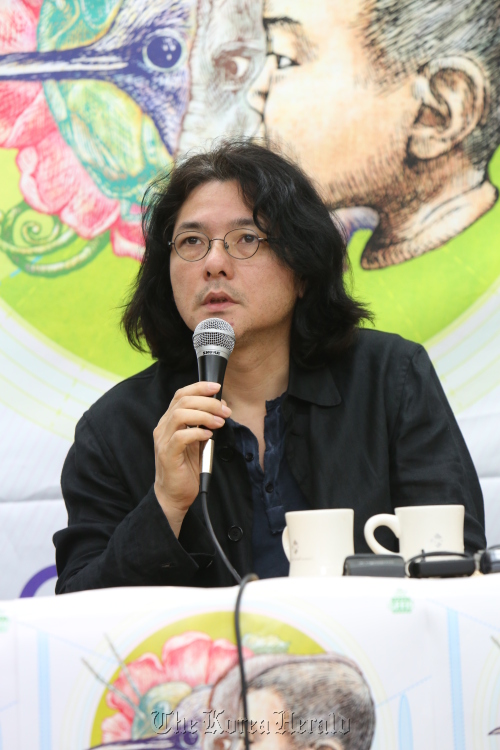Director of ‘Love Letter’ criticizes Japanese media’s coverage of the nuclear disaster
For those used to seeing Iwai Shunji’s sentimental romantic films such as “Love Letter” and “Hana and Alice,” his latest film may come as a surprise.
The film, titled “Friends after 3.11,” is a documentary with no fictional narrative. The anti-nuclear film deals with the 2011 Tohoku earthquake and tsunami, and Shunji’s own friends who were affected by the catastrophic event.
“I’m a filmmaker but I’m also a human being,” said Shunji during a press conference at CGV Yongsan in Seoul on May 10. He was in Korea to attend the opening of the Green Film Festival in Seoul, where his film was screened.
“As a human being I could not be silent about this nuclear issue. If I don’t speak out about this now, I don’t think the viewers would take my future works seriously ― even if I make films like ‘Love Letter’ once again.”
For those used to seeing Iwai Shunji’s sentimental romantic films such as “Love Letter” and “Hana and Alice,” his latest film may come as a surprise.
The film, titled “Friends after 3.11,” is a documentary with no fictional narrative. The anti-nuclear film deals with the 2011 Tohoku earthquake and tsunami, and Shunji’s own friends who were affected by the catastrophic event.
“I’m a filmmaker but I’m also a human being,” said Shunji during a press conference at CGV Yongsan in Seoul on May 10. He was in Korea to attend the opening of the Green Film Festival in Seoul, where his film was screened.
“As a human being I could not be silent about this nuclear issue. If I don’t speak out about this now, I don’t think the viewers would take my future works seriously ― even if I make films like ‘Love Letter’ once again.”

Shunji is a native of Sendai, the harbor town at the center of last year’s earthquake and tsunami. The natural disaster caused the ongoing level 7 meltdowns in the Fukushima Nuclear Power Plant.
The project began as Shunji visited his hometown with a camcorder a week after the tsunami hit the region. At the time it was only a personal trip, and he had no intention of making a film.
“I just filmed the ruins of the buildings and other sceneries of the town after the earthquake,” said Shunji. “And then I ran into a group of people who were organizing various events to speak out about the issue of the Fukushima nuclear plant.”
In the movie, Shunji interviews a wide range of people such as nuclear specialists, popular singers, reporters and environmentalists about the meltdown of the Fukushima nuclear power plants and asks their opinion about where Japan should be going with nuclear plants in future. He also introduces real life stories of the people who witnessed and survived the event.
During the conference, Shunji openly criticized the Japanese media for their coverage of the nuclear meltdown. He claimed that the Japanese press “would never say anything negative” about nuclear power, in spite of the obvious damage of last year’s catastrophic event.
“Many Japanese media outlets described the Fukushima meltdown as something ‘unexpected,’” said Shunji.
“But no nuclear meltdown can really be ‘unexpected.’ Everything should be predicted and taken care of before anything disastrous happens. That is why it is important for the foreign press and people to raise concerns about this issue so the Japanese people can do something in spite of the manipulative media.”
Japan shut down all of its 54 nuclear reactors this month.
“It took a very long time and tremendous efforts to make that happen,” said Shunji about Japan’s shutdown of the reactors. “The media would very often choose not to report the anti-nuclear public demonstrations.”
The documentary was released in Japan in March. Shunji is currently filming the squeal of “Friends after 3.11.” The Green Film Festival in Seoul wraps up on Tuesday.
By Claire Lee (dyc@heraldcorp.com)







![[KH Explains] How should Korea adjust its trade defenses against Chinese EVs?](http://res.heraldm.com/phpwas/restmb_idxmake.php?idx=644&simg=/content/image/2024/04/15/20240415050562_0.jpg&u=20240415144419)










![[Today’s K-pop] Stray Kids to return soon: report](http://res.heraldm.com/phpwas/restmb_idxmake.php?idx=642&simg=/content/image/2024/04/16/20240416050713_0.jpg&u=)